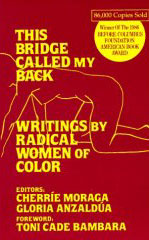|
I explain my mother to my father my father to my little sister
My little sister to my brother my brother to the white feminists
The white feminists to the Black church folks the Black church folks
To the ex-hippies the ex-hippies to the Black separatists the
Black separatists to the artists the artists to my friends’ parents…
Then
I’ve got to explain myself
To everybody
I do more translating
Than the Gawdamn U.N.
Forget it
I’m sick of it.
I’m sick of filling in your gaps
Sick of being your insurance against
the isolation of your self-imposed limitations
Sick of being the crazy at your holiday dinners
Sick of being the odd one at your Sunday Brunches
Sick of being the sole Black friend to 34 individual white people
Find another connection to the rest of the world
Find something else to make you legitimate
Find some other way to be political and hip
I will not be the bridge to your womanhood Your manhood
Your human-ness
I’m sick of reminding you not to
Close off too tight for too long
I’m sick of mediating with your worst self
On behalf of your better selves
I am sick
Of having to remind you
To breathe
Before you suffocate
Your own fool self
Forget it
Stretch or drown
Evolve or die
The bridge I must be
Is the bridge to my own power
I must translate
My own fears
Mediate
My own weaknesses
I must be the bridge to nowhere
But my true self
And then
I will be useful
In 1991, at the University of Washington in Seattle, I enrolled in a course at the Women’s Studies Department and the anthology This Bridge Called My Back: Writings by Radical Women of Color was a required text.  Rushin’s poem, used to set the tone of this book, was my introduction to the power of feminist expression. Rushin’s poem, used to set the tone of this book, was my introduction to the power of feminist expression.
This Bridge Called My Back was originally published by Persephone Press, Inc. In 1981, when that publisher ceased operation and the book was out of print, a second edition of This Bridge Called My Back was published in 1983 by the now defunct Kitchen Table: Women of Color Press. The importance here lies in the fact that all the key people who brought this book back for a second edition were women of color: the co-editors, Cherríe Moraga and Gloria Anzaldúa and the co-publishers Barbara Smith and Audre Lorde.
I grew up in a liberal household so the concept of female empowerment was part of my early development. My mother’s voice was strong and relevant in my home and both my mother and my father made a conscious effort to raise their children with compassion and un-bias and to encourage us in scholarly pursuits and the Arts. I was a voracious reader and my parents fed that hunger. But the majority of what was (and still is) deemed “great literature” in elementary and high school curriculum, is a white male western point of view. And I am not condemning this view. I could not have survived the angst of my teenage years without Mark Twain or Thomas Mann, D.H. Lawrence or Dostoyevsky or Dickens, or George Bernard Shaw and Eugene O’Neill, to name too few. And there were women like Jane Austen, Emily Dickinson, George Eliot and Virginia Woolf. But to be a 19-year-old woman, just barely a woman, just coming into my sexuality, looking for my place and my voice in the world, and to read works that reflected a point of view that was not only female, but at times was lesbian or latina or black, was an epiphany for me.
I reveled in the words of women feeling caught at cultural crossroads, not always fitting into a society that didn’t take their skin color/sexuality/vagina into account. I found comfort in the words of Cherríe Moraga and Rosario Morales who, like me, had a mixture of race and culture and religion in their backgrounds which both defined them and isolated them at times. And while most of my life I may have been made to feel like I didn’t fit in as a “white girl”, I was made to realize how I took my fair skin color for granted.
I discovered that the universal voice in so many art forms was one that had been indoctrinated, so that when an artist didn’t fit that “voice” the message seemed foreign or too bogged down by a political agenda. But art becomes brilliant and transcends the artist when it speaks of the human experience through a multitude of textures, shades and hues that flavor the medium of choice.
Today, mainstream entertainment and art does reflect a slightly broader cultural perspective and the contributions of these four women along with all the writers included in the anthology have played a part in this evolution. This book is still listed on course readers at universities across the country and there are generations of women, myself included, that have been impacted by this seminal work. This Bridge Called My Back opened my eyes to how I absorb information around me and what I produce. It planted an agenda in me. I have dedicated my column to artistic achievements of women and dubbed 2008 “The Year of the Woman” because I feel a revolution coming. Or maybe it’s just a hope that while maybe “the more things change, the more things stay the same”, maybe, just maybe, there can be a world that reflects the creation of life and not the destruction of it.
|
